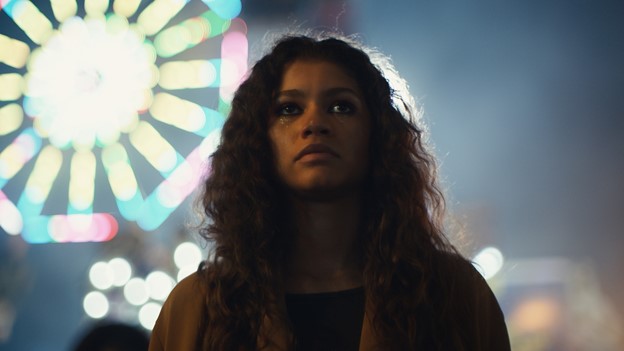Euphoria: A look inside the mind of a teenager
Euphoria explores the emotional highs and lows of teenage relationships while unflinchingly examining controversial, real-life issues.
HBO premieres its second season of the hit high school drama, Euphoria, on January 9.
January 23, 2022
HBO Max’s series Euphoria, now in its second season, is a hit among teenagers and young adults. This series attracted critical acclaim, with its lead actress Zendaya winning a People’s Choice Award for Drama TV Star of the Year and a Primetime Emmy Award for Outstanding Lead Actress in a drama series.
Euphoria offers an in-depth look into the day-to-day lives of high schoolers, following fictional Los Angeles high school students as they navigate love, friendship, trauma, and social media. Director Sam Levinson gives us an unflinching look at the highs and lows of substance abuse, depression, self-harm, and discovering one’s sexuality.
Euphoria focuses primarily on Rue (Zendaya), a 17-year-old struggling with depression and drug addiction. The summer of her junior year, she went into rehab after a traumatic moment in which she was found on the floor by her sister Gia (Storm Hunter), following a drug overdose. Despite a two month stay in rehab, Rue has no intentions of staying sober following her release.
At the end of episode one, season one, Rue meets a new girl named Jules (Hunter Schafer). Rue and Jules later become best friends. Rue met Jules at a house party, where Jules pulled a knife out on Nate (Jacob Elordi) to protect herself from his unwanted advances. Throughout the season, Rue grows too emotionally attached to Jules. Rue becomes sober for Jules, and their relationship hinges on her sobriety. The love Rue had for Jules wasn’t just a friendship-type of love; Rue was infatuated with Jules.
In adolescence, everything that may happen to you, no matter how big or small, seems to bear the same hyperbolic weight. Anything great seems like a vacation while anything unpleasant feels like Armageddon. This emotional experience is best conveyed by Euphoria. This show can accurately capture the lives of modern-day teenagers, making us relate to some of the characters’ backstory and their struggles.
Euphoria goes a lot deeper than just showing us the lives of teens. Euphoria shows viewers exactly why its characters act and behave the way they do by revealing their childhood traumas and the psychology behind that trauma.
Nate, for example, is a certified psychopath with a toxic masculinity mindset, but the show gradually reveals the cause of Nate’s behavior–his childhood in a misogynistic household. When things don’t go according to plan, Nate gets irritated. But he’s enraged not merely because something isn’t working well; he’s enraged because he knows he can’t fix it properly.
Intensely graphic, Euphoria was made for a more mature audience. This display of raw material depicts how a young generation lives and learns in an unfiltered, always internet-accessible society; a internet-driven society which was never a reality for previous generations. Teenagers can all connect to what Euphoria depicts, which is one of the numerous reasons why this series has resonated with so many viewers. The show’s primary purpose is to assist adolescents in learning how to conquer life while also reassuring them that they are not alone.

